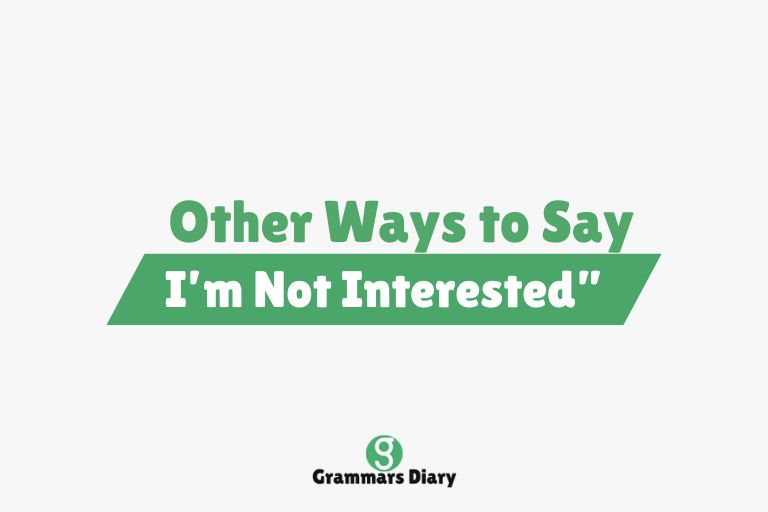The phrase “I’m not interested” is commonly used to express a lack of enthusiasm, curiosity, or desire to pursue something, whether that’s a conversation, proposal, offer, or idea. While it gets the message across, repeating this phrase too often or in the wrong tone can come off as blunt or dismissive. Depending on the context—professional, personal, or casual—there are more nuanced and considerate ways to convey the same sentiment.
This article presents a detailed list of alternative expressions to “I’m not interested,” along with meanings, examples, and appropriate usage situations to help you respond with more clarity, grace, or subtlety depending on your audience.
Other Ways to Say “I’m Not Interested”
1. I’ll have to pass
Example: “Thanks for the invite, but I’ll have to pass this time.”
Meaning: A polite way of declining without completely shutting the door, this phrase acknowledges the offer but expresses disinterest in participating.
Usage: Ideal for casual social invitations or offers, where you want to maintain a positive tone while declining.
2. That’s not really my thing
Example: “I appreciate the suggestion, but sci-fi just isn’t really my thing.”
Meaning: This phrase personalizes your lack of interest without invalidating the topic or person, making it clear that your disinterest stems from personal preference.
Usage: Suitable for conversations about hobbies, entertainment, or general preferences.
3. I’m going to pass on this
Example: “I’ve thought about it, and I’m going to pass on this opportunity.”
Meaning: A straightforward but respectful expression that signals disinterest or refusal, often used after consideration.
Usage: Frequently used in professional or decision-making contexts, especially when you want to be firm yet courteous.
4. It’s not something I’m looking for right now
Example: “I understand your offer, but it’s not something I’m looking for right now.”
Meaning: This sentence expresses a current lack of interest while keeping future possibilities open, making it sound less like a final rejection.
Usage: Common in business conversations or sales settings when you want to decline politely without burning bridges.
5. I’m not really into that
Example: “Honestly, I’m not really into sports, so I’ll skip the game.”
Meaning: A casual and honest way to express that a topic or activity doesn’t align with your interests.
Usage: Best for informal interactions with friends or acquaintances.
6. I think I’ll sit this one out
Example: “That party sounds fun, but I think I’ll sit this one out.”
Meaning: This phrase communicates your decision not to participate without giving a detailed reason, making it soft and non-confrontational.
Usage: Often used in group settings when turning down an invitation.
7. I’ll pass, but thank you
Example: “That’s a generous offer—I’ll pass, but thank you.”
Meaning: This version adds an element of appreciation, softening the refusal and acknowledging the effort of the other person.
Usage: Appropriate in both personal and professional settings where politeness is essential.
8. I’m not feeling it
Example: “We could try that restaurant, but I’m just not feeling it tonight.”
Meaning: A relaxed way to say you’re not excited or inclined toward something at the moment.
Usage: Suited for casual or familiar environments where informal language is acceptable.
9. That’s not for me
Example: “Thanks for the suggestion, but that’s not for me.”
Meaning: A clear and concise statement that removes yourself from the option without being critical or dismissive.
Usage: Works well in discussions about ideas, preferences, or proposals.
10. I’m not in the market for that
Example: “I’m not in the market for new insurance right now, but thank you for reaching out.”
Meaning: Common in consumer and sales situations, this phrase professionally declines a commercial offer.
Usage: Ideal for phone solicitations, product pitches, or service proposals.
11. I’ll take a rain check
Example: “Thanks for the offer, but I’ll take a rain check on the concert.”
Meaning: This phrase implies that while you’re not interested right now, you may consider it in the future, giving your refusal a temporary and non-definitive tone.
Usage: Common in friendly or social contexts when you want to decline without closing the door entirely.
12. I’m not into it
Example: “They asked me to join the fantasy football league, but I’m just not into it.”
Meaning: A direct and casual way to say something doesn’t align with your personal taste or interests.
Usage: Works well in informal conversations, particularly when discussing trends, activities, or entertainment.
13. It’s not really appealing to me
Example: “That new product you mentioned isn’t really appealing to me at the moment.”
Meaning: This conveys a more refined, polite version of disinterest and implies that the subject lacks allure or personal value.
Usage: Appropriate for professional conversations, marketing feedback, or polite refusals.
14. I’m not looking to get involved
Example: “I understand the project, but I’m not looking to get involved at this time.”
Meaning: A formal and non-confrontational way to decline participation in something that requires commitment or investment.
Usage: Best for work-related or volunteer projects when you want to set boundaries without sounding negative.
15. I’d rather not
Example: “I’d rather not join that discussion—it’s not really something I want to get into.”
Meaning: A reserved and respectful way to decline or opt out, often used to maintain peace or avoid conflict.
Usage: Useful in sensitive situations or when navigating complex conversations.
16. It doesn’t align with my priorities
Example: “I appreciate the offer, but it doesn’t align with my priorities right now.”
Meaning: This phrase suggests that your decision is guided by a thoughtful consideration of your current goals, not by a lack of appreciation.
Usage: Effective in business or professional scenarios where you need to justify your refusal without sounding dismissive.
17. I’m currently focusing on other things
Example: “I’d love to explore that someday, but I’m currently focusing on other things.”
Meaning: A tactful way to express disinterest by pointing to existing obligations, helping you maintain a positive tone while declining.
Usage: Ideal for professional networking, collaborations, or long-term project proposals.
18. That’s not a priority for me right now
Example: “While I see the value, it’s not a priority for me right now.”
Meaning: This clarifies that your disinterest is temporary or due to scheduling rather than due to a lack of merit in the idea itself.
Usage: Common in workplace settings or task management discussions.
When to Use Different “I’m Not Interested” Alternatives
In Professional Settings
In business or workplace environments, tone and diplomacy are key. Expressions like “It doesn’t align with my priorities,” “I’m currently focusing on other things,” or “I’m not looking to get involved” maintain professionalism while clearly communicating your position without offending the person making the proposal or request.
In Personal or Social Interactions
For friendly conversations or casual settings, a lighter tone works best. Phrases like “That’s not really my thing,” “I think I’ll sit this one out,” or “I’ll take a rain check” strike the right balance between honesty and politeness while avoiding unnecessary tension or awkwardness.
In Sales or Cold-Call Situations
When dealing with sales pitches, telemarketers, or unsolicited offers, it helps to be direct while staying courteous. Statements such as “I’m not in the market for that,” “I’ll pass, but thank you,” or “It’s not something I’m looking for right now” make your boundaries clear while minimizing conflict or follow-up pressure.
Conclusion
Saying “I’m not interested” is a necessary part of communication, but using it too frequently or in the wrong tone can sometimes sound abrupt or insensitive. As we’ve explored in this article, there are many thoughtful, strategic, and context-appropriate alternatives that let you express disinterest while maintaining respect, professionalism, and rapport. Whether you’re responding to an idea, an offer, or a conversation you’d rather avoid, choosing the right expression can make all the difference in how your message is received.
FAQs
What does “I’m not interested” mean?
“I’m not interested” is a direct way to express a lack of desire or curiosity about something, such as an offer, topic, or activity.
Is it rude to say “I’m not interested”?
It depends on the tone and situation. While the phrase isn’t inherently rude, it can come off as dismissive in sensitive or professional settings if not used with care.
What is a more polite way to say “I’m not interested”?
Polite alternatives include phrases like “I’ll have to pass,” “It doesn’t align with my priorities,” or “That’s not for me,” which convey the same message with a softer tone.
Can I use “I’m not interested” in a job interview or professional setting?
In most professional contexts, it’s better to use more refined language, such as “I’m not pursuing that path at the moment” or “That’s not a fit for my current goals,” to maintain professionalism.











